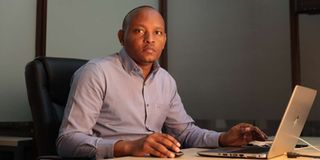Christopher Karani: Prepare to work fewer hours, in semi-permanent stations

Founder of Workplace Africa Christopher Karani.
What you need to know:
- A career coach helps you craft your story as you prepare to land your dream job.
- Company heads ought to take this concept more seriously and practice inclusive leadership.
- Many employers have discovered that the design of their workplaces isn’t as conducive as they thought.
Christopher is a talent development specialist and has worked for several Fortune 500 companies, among them Unilever.
Why is coaching so important for professionals?
Career coaching is critical in helping individuals understand their career journeys. A career coach helps you craft your story as you prepare to land your dream job. The process encompasses, among other activities, knowledge on how to prepare for interviews, drafting proper CVs and even introduction to potential employers. Career coaches also teach their mentees critical workplace skills which can help them make informed decisions about their careers.
What has been your biggest contribution to the organisations you have worked for?
One thing I am proud of is that I’ve been involved in growing and developing talent among university graduates and senior directors in multiple organisations. Through my support, these individuals have managed to flourish in their professions.
To what extent should top managers establish diversity and inclusion at the workplace?
This is not just the right thing to do, it also makes business sense. The biggest challenge, however, is that most managers aren’t even aware of the existing biases. Company heads ought to take this concept more seriously and practice inclusive leadership. All other leaders should get on board and help drive this important agenda.
But why are some companies hesitant to explore diversity and inclusion?
Ethnic and cultural differences, which yield cognitive and unconscious biases, are to blame for the failure or absence of diversity and inclusion programmes within most businesses. Communication within teams and work groups often becomes a substantial challenge when there is a higher variance in employees’ backgrounds. Divergent predispositions and cultures often result in different forms of expression. Sadly, many managers do not attach the necessary value and resources to drive this agenda.
Most employees still don’t feel safe at their workplaces. Where are employers going wrong?
Safety and dignity in today’s workplace takes many different forms. These include the dress code, working space and privacy. Others are the number of working hours and freedom to dissent without consequences. Any serious organisation should consistently strive to establish a decent work environment. It is important to strike the balance between the organisational culture and providing a safe and dignified work space. Even more important, they should make adjustments whenever necessary.
Will workplaces be better after Covid-19?
Covid-19 has been a major eye-opener for most employers. Many have discovered that the design of their workplaces isn’t as conducive as they thought. In fact, some employers have taken this period to create more office space and invest on better ventilation.
That said, with remote working now taking centre stage, most workplaces will be designed to accommodate fewer workers at any given time. Majority of professionals will be reporting to the office to work for fewer hours. Semi-permanent work stations may become the standard going forward. The future looks interesting!
What does Workforce Africa do?
We make it possible for businesses to access the right talent for optimal performance. We also connect individuals to existing opportunities by supporting organisations to transform through organisational design, recruitment and audit. We also provide access to labour either through outsourcing or HR support.
How has Covid-19 altered the HR function within organisations?
First, HR teams have had to work with business heads to engage employees and boost their morale. There has also been a great need to provide emotional support to employees as they deal with the turbulence. Overall, there has been an increase in employee support to sustain their productivity.
What must employers do to surf the tide?
Foremost, HR must reconfigure workflows, redeploy talent and support telecommuting. Additionally, there’s renewed need to come up with effective ways to ensure that talent is flexible enough to respond to market dynamics. For organisations to be competitive, HR must upskill their staff so that they stay relevant and productive.
How do you deal with your own shortcomings as a professional?
I accept that there are things I don’t know. I always accept my weaknesses and seek guidance and feedback from my colleagues and partners. At work, I recruit people with the skills I don’t have because I endeavour to improve myself through constant learning.
HR is often dismissed as an extension of the management rather than the workers’ advocate. How have you managed to balance this seesaw?
I try to be as fair as possible in handling disputes, while exercising utmost good faith whenever there are challenges.
Besides family and career, what are your proudest achievements?
Establishing Workforce Africa and seeing it grow. Positioning it as a talent solution for companies and a channel for professionals to access opportunities has been a joyful process and a learning curve for me. It is from this experience that I draw the inspiration to keep going.
What is your greatest desire in life?
To see individuals access decent opportunities to work and improve their livelihoods. Putting our future generations at a better place through creation of opportunities and support structures is close to my heart.




